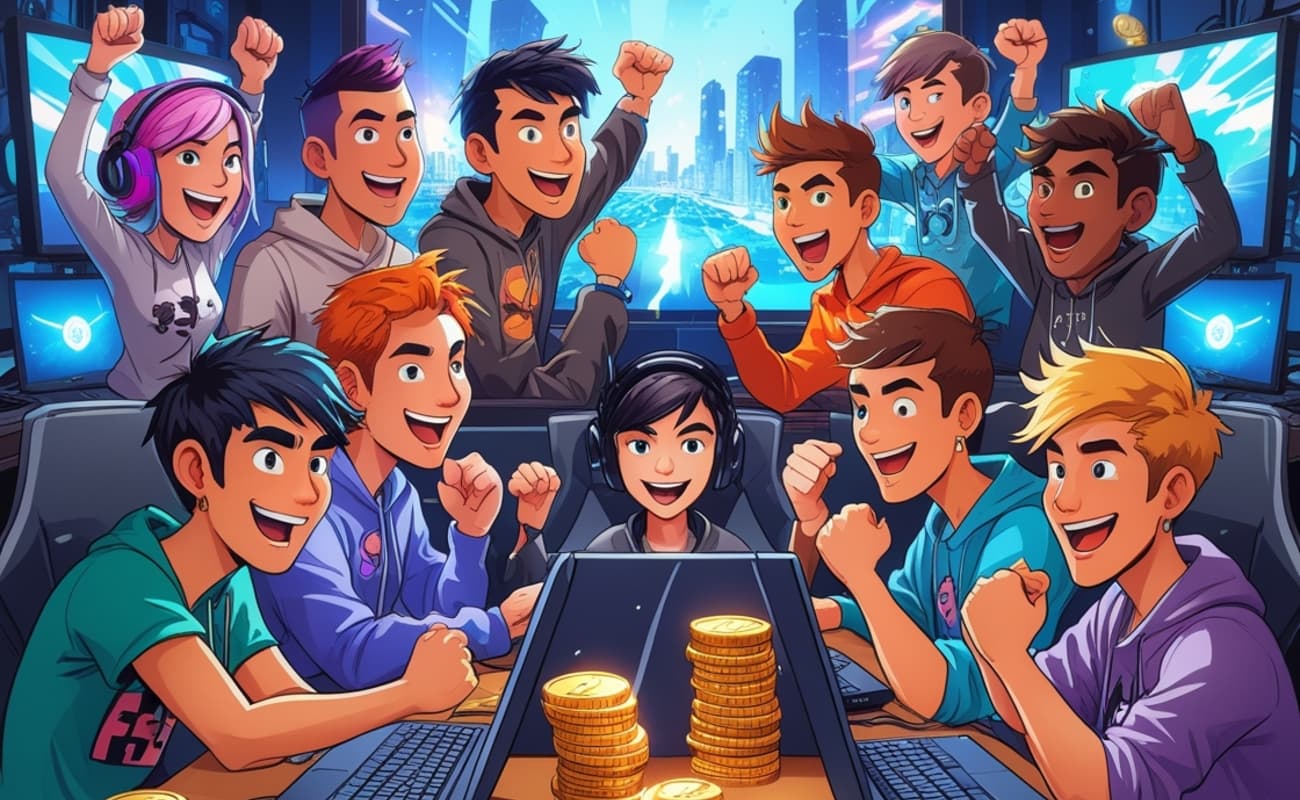In recent years, a new genre of online gaming has taken the world by storm, raising the question: are play to earn games real? With promises of converting virtual achievements into real-world income, the crypto gaming space has become a hot topic, especially among teenagers and young adults. In this article, we delve into the economic models behind play-to-earn (P2E) games, explore the sustainability of these models, and provide insights based on real user experiences and industry analysis. We will also compare reputable platforms with those that turn out to be scams, helping you discern the genuine from the misleading.
The Economic Backbone of Play-to-Earn Games
The concept behind P2E games is both intriguing and complex when considering Are Play to Earn Games Real. Game developers design virtual ecosystems in which players earn tokens, NFTs, or cryptocurrencies as rewards for their time and skill, leading many to ask Are Play to Earn Games Real in terms of financial viability. These rewards can later be exchanged for real money, providing a potential source of income, prompting the crucial question: Are Play to Earn Games Real in the sense of offering a stable financial opportunity?
Understanding In-Game Economies
Many P2E games operate on the principles of blockchain technology and decentralization, ensuring transparency and traceability of in-game currency, a key factor in determining Are Play to Earn Games Real. The fundamental idea is similar to any other digital economy: supply and demand determine the value of the tokens, influencing whether Are Play to Earn Games Real as a source of income. In a healthy ecosystem, a balanced distribution of tokens can create long-term sustainability, allowing dedicated players to earn appreciable returns over time, supporting the idea that Are Play to Earn Games Real. Conversely, when the supply of tokens is excessive or the in-game economic model is flawed, the value can plummet, making it difficult for players to convert their earnings into significant real-world money, raising doubts about Are Play to Earn Games Real for stable income.
Conversion to Real Money
One critical aspect of assessing whether Are Play to Earn Games Real is to investigate the conversion mechanism. Most reputable platforms partner with major cryptocurrency exchanges or use decentralized finance (DeFi) protocols to allow players to trade their in-game tokens for widely recognized cryptocurrencies or fiat money, a crucial step in making Are Play to Earn Games Real. However, the ease and reliability of these conversions vary widely between platforms, impacting whether Are Play to Earn Games Real for practical financial gain. For instance, popular P2E games such as Axie Infinity have established robust systems that allow smooth transitions from in-game operations to the global financial market, setting a benchmark in the sector and bolstering the argument that Are Play to Earn Games Real.

Economic Sustainability and Revenue Generation in P2E Games
While many claim that these games offer a steady income stream, the reality is more nuanced. The economic model of P2E games relies heavily on continuous player participation and market trust. When significant new user growth or additional investment slows down, it can lead to a downturn in the token value, making it challenging to sustain substantial rewards for players over time.
Evaluating Revenue Sources and Risks
Revenue in P2E ecosystems typically comes from multiple sources such as transaction fees, NFT sales, and in-game advertisements. Yet, the volatility inherent in cryptocurrency markets introduces substantial risks. When evaluating if play-to-earn games are real income generators, it is essential to consider these risks. A balanced approach requires understanding the impact of market fluctuations, game popularity, and developer transparency on the overall revenue model. For instance, well-designed games might share revenue between developers and players, ensuring consistent rewards even during market downturns. On the other hand, projects with opaque financial structures may lead to unpredictable outcomes, often bordering on digital gambling.
Identifying Trustworthy Play-to-Earn Platforms
One of the biggest challenges for users is separating reputable Are Play to Earn Games Real platforms from scams. Fortunately, there are clear indicators that can help players discern authenticity when evaluating Are Play to Earn Games Real opportunities. Reputable games showcase transparent economic models, providing clear details on token supply, distribution, and in-game utility, which helps users assess if Are Play to Earn Games Real for long-term earnings. They also offer comprehensive audit reports from independent firms, demonstrating a commitment to security and transparency, crucial for determining if Are Play to Earn Games Real and safe. Furthermore, legitimate platforms foster active communities where users discuss both positive and negative experiences, offering a balanced view of whether Are Play to Earn Games Real in their claims.
By contrast, many dubious platforms that claim Are Play to Earn Games Real often lack such transparency and offer unrealistic promises that do not materialize over time, raising red flags about whether Are Play to Earn Games Real and trustworthy. It’s crucial to research thoroughly and even look for independent technical audits before investing any significant time or money to determine if Are Play to Earn Games Real and secure. Checking for well-established development teams with a proven track record in the gaming industry is also a key step in verifying if Are Play to Earn Games Real and reliable. Be wary of anonymous developers or projects lacking clear documentation, as this can be a sign that the Are Play to Earn Games Real opportunity may be a scam.
Reputation, Community Feedback, and Developer Transparency
When questioning, are play to earn games real money-makers, one should look into community forums, user reviews, and expert analyses. Platforms that have endured over time and adapted to market changes are generally more trustworthy. In many cases, player forums and social media groups reveal both success stories and cautionary tales, which can be invaluable for a potential entrant in the market. Ultimately, if a game’s developer is forthcoming about challenges and updates, it’s a sign of credibility. As you research, consider connecting with established communities on Reddit, Discord channels, or even exploring your local network of gamers to get firsthand user experiences.
A Closer Look: Comparing the Best and the Rest
To further help paint the varied picture of P2E games more vividly, the following table compares some key metrics between quality games and those that may be fraudulent:
| Criteria | Reputable P2E Games | Dubious Platforms |
|---|---|---|
| Transparency | Clear roadmap, public audits, open development | Opaque algorithms, unverified claims |
| User Base | Active and engaged global community | Flash communities with sudden declines |
| Conversion Mechanism | Reliable, partnered with reputable exchanges | Complicated, often hidden fees or conversion issues |
| Revenue Stability | Balanced tokenomics, sustainable growth | High volatility, prone to market manipulation |
| Developer Communication | Regular updates and community engagement | Minimal or no updates, vague future plans |

Experiences from the Field: Real User Feedback
Speaking from a personal perspective and drawing on dozens of online gaming community testimonials, success stories in play-to-earn gaming are as heartening as the cautionary tales are sobering. A number of players have documented earning a regular supplemental income through games like Axie Infinity, where cautious play and smart investments have turned hobbies into streams of income. But also a few users caution about projects that promise exaggerated returns and leave them holding worthless tokens and no evident exit.
Have you ever fantasized about whether your playtime in a game might one day become real money? The reality usually rests on the design of the game and whether the team is able to provide constant support. In its essence, while some play-to-earn games unlock genuine possibilities, others are a costly lesson in virtual risk management.
Probing the Future: Will Cryptocurrency Gaming Evolve?
As blockchain technology has been evolving at a rapid pace, the majority of specialists predict that the ecosystem of play-to-earn games will continue to simplify its models. Hybrid models that blend traditional gaming concepts with the openness and decentralization benefits of blockchain may be coming sooner rather than later. For instance, sites can have more sophisticated insurance mechanisms for safeguarding players‘ investments and even more dynamic economic designs to fit various market conditions.
So, to return to our original question, are play to earn games legit? In the majority of cases, yes—they are legitimate websites with innovative economic models. But as with any rapidly evolving business, there is nevertheless a variety of quality and reliability. The secret is to play with proven and well-known brands, learn from experienced players, and maintain a skeptical but open-minded approach to new opportunities.
Additional Resources and Further Reading
For those eager to dive deeper into this exciting world, consider checking out our detailed review on the Best Play to Earn Games. This resource provides comprehensive insights into some of the most promising titles currently available and can help you determine which platforms might be worth your attention. Additionally, external research can further solidify your understanding; for instance, sources like CoinMarketCap’s overview on play-to-earn gaming offer expert perspectives and reliable data.
Frequently Asked Questions (FAQ)
1. Are play to earn games a viable long-term source of income?
While many play-to-earn games offer genuine opportunities to supplement income, their long-term viability depends on several factors, including market stability, game popularity, and the transparency of their economic model. Always research and monitor updates from developers before committing significant time or capital.
2. How can I tell if a P2E game is authentic or a scam?
Look for clear and transparent tokenomics, active community engagement, regular developer updates, and partnerships with reputable exchanges. Reviews and discussions on trusted forums can also help in determining a game’s legitimacy.
3. Can I convert my in-game tokens to real money easily?
In reputable platforms, conversion mechanisms are well-integrated with cryptocurrency exchanges or DeFi protocols. However, ease of conversion can vary, and you should always be aware of potential transaction fees and market volatility before making conversions.
4. What are some common risks in the P2E model?
Risks include significant token price volatility, over-reliance on new player inflows to sustain income, and potential technical issues with blockchain platforms. Conduct thorough research and consider diversifying your investments across multiple venues.
5. How will the P2E landscape change in the future?
As blockchain technology advances, expect more robust and hybrid gaming models that better safeguard player investments and ensure economic sustainability. Future developments might also include enhanced regulatory frameworks, making the ecosystem more secure and reliable for users.
In conclusion, the question of are play to earn games real cannot be answered with a simple yes or no. The industry is complex, with vast potential and significant risks. If you’re considering venturing into crypto gaming, always educate yourself, engage with the community, and be cautious with your investments. Happy gaming and stay informed!
